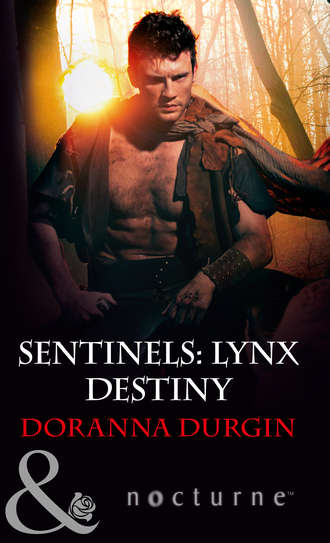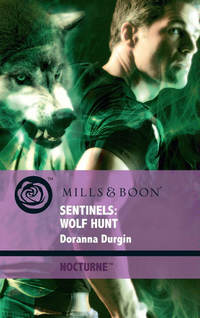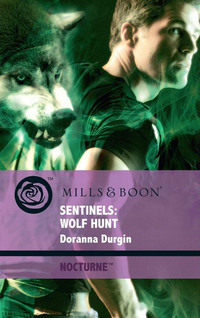
Полная версия
Sentinels: Lynx Destiny
Kai set the satchel on worn floorboards and shrugged out of the jacket, handing it over with an obedience that, to judge by Bill’s sly look, fooled no one.
Mary eyed the red bandanna. “Someone did a nice job for you.”
“Regan,” Kai said, and Mary’s eyebrows shot up. Kai added, “Regan Adler.”
“That’s right,” Bill said, snapping his fingers a few times as if scaring up memory. “Frank headed into Texas for some big therapy work on his back—he’s staying with his brother. He said something about his daughter coming back.... I’d forgotten all about it. Surprised she’d have anything to do with the place.”
Kai quit frowning at the stained bandanna. “Why?”
Bill opened his mouth to reply, but Mary cut him off with a brisk cluck of her tongue. “That’s Regan’s business, you old busybody. She’ll tell him if she feels like it.” She aimed admonishment toward Kai. “And you—you have her look at that arm again, won’t you?”
“I guess I’d better,” he admitted. The gauze had been all cotton; the bandanna had been all cotton. That meant both had been preserved during the change to lynx and back—just as with the buckskin leggings and breechclout, and just exactly why he wore them. But the wound should have stopped bleeding long ago. Maybe he’d done something to it while he was in his lynx form.
The lynx tended to get caught up in other things while on the move.
“Oh!” Mary said, apparently satisfied on that score. “We got a letter for you!”
“A what?” Kai said, unable to help himself.
“Sure, a couple of weeks ago.” She glanced up from her rummaging under the counter and gave him a pointed look. “You should come in more often, Kai.”
“That’s right,” Bill grunted, making a notation on his papers. “Whether you need to or not. Just so Mary knows you’re all right.”
Quick as that, Mary turned and gave him a faux slap. “Wasn’t me that was asking after him a couple days ago,” she said, and Bill met Kai’s gaze and shrugged, a “What’re you gonna do?” expression behind Mary’s back as she bent to look deeper on the shelves. “Here we go,” she said, and straightened with a business-size envelope in hand. “Probably one of your happy hunters, don’t you think?”
The hunters usually came to him through Martin Sperry—who handled the finances, checked the permits and vetted the hunters—but sometimes they did try to bypass Martin in hopes of lower rates.
Kai reached for the letter and stiffened.
He knew those stark block letters. He’d always know those stark block letters.
His father.
After fifteen long years? After making it so clear that they could never—would never—connect again?
Not after the Core had found Aeron Faulkes those years earlier—not when he’d barely been able to shake them before returning home to gather up his wife, Lily, and his young daughter, and to say goodbye to his son—a day they’d all known was coming. “Kai?” Mary gestured with the letter, concern on her face.
He shook off his reaction and took the envelope. “You’re probably right,” he said, unconvincing even to his own ears. “A hunter.” He scooped up his satchel and tucked it over his shoulder. “I’ll look for the dried fruit. Thank you.”
Mary exchanged a glance with Bill, who hadn’t bothered to hide his concern. But she said only, “Don’t forget to come back for your jacket after the library.”
“No,” Kai said, the letter stuffed into his back pocket only through the dint of greatest willpower. “I won’t.”
His father. His family.
And the Core, back in his world.
* * *
Regan tossed the washcloth in the laundry and ran a quick load, hanging it out to dry and watching the blue roan pretend to have antics over the mild flap of cloth in the breeze. She pondered the garden—should she plant? Would she be here long enough? Would her father be back?—and pulled out her easel, setting it precisely in the best light in her small bedroom studio space.
And then she gave up pretending that the morning hadn’t happened, that she hadn’t attacked a man with her walking stick, that Kai hadn’t been skimmed by a bullet or that her hands weren’t still shaking now and then. She stood by the living-room window to look out at Bob, dozing in the sun, and spoke to the old cat.
“I could head down the hill and take in a movie,” she told the cat, who didn’t care. “I could drive out and get some touristy pistachio products.”
The cat made squinty eyes at her.
“Could check out the garden center.”
The cat yawned and stretched hugely—suddenly a long, flexible thing with claws extruded at almost every appendage. At great risk, she gave its belly an admiring pat. “Nothing stretches like a cat,” she said. “Nice job, there.” She couldn’t help but join it, stretching out some of the lingering shivers of the morning, regretting that she’d agreed not to call the police...thinking it not too late.
Her gaze fell on her father’s desk—on the business cards she’d left out, side by side. Matt Arshun.
She’d almost forgotten.
Not that she had any intention of calling him. But she’d certainly check him out. She had the feeling he’d be back—and she didn’t want to be caught flat-footed a second time.
She tossed a light jacket into the passenger seat of her bright yellow FJ Cruiser—nothing but four-wheel drive for this area—and headed into town.
Their dirt road took a curving path down to the heavily graveled dirt connector, which took her past the occasional driveway to tucked-away summer homes. A couple of miles out she hit the asphalt, a winding road that ran the edge of this slope face, and which quickly took her into town.
The road had changed since her last visit here, years earlier. More guardrails...mesh screening to the inside of the curves where the rock loomed high and close, and always threatened to trickle down on the unwary. And Cloudview, as she grew closer, held an obvious little cluster of new conveniences—a single mega gas station almost obscuring the old block mechanic’s garage, a mini movie rental place tucked in behind and new improvements to the long, narrow park where the summer festivals squatted, one after the other, during the tourist season.
But the town was essentially what it had always been—a long, narrow crossroads built on sheep farming, orchards and hunting, with topologically terraced layers of activity. Along the south street front the original old buildings—heavy log and overhung raised porches, most of them connecting—hosted Realtors and banks and artisans. Rising up on the next level behind them, vacation cabins pushed back into the rising ground, tucked in behind trees and perched on sharp angles. Twisty stairs, stone-paved paths, and wraparound porches ruled the day...and the decades.
The north side of the street held a layer of more practical things—the elementary school, a bank, a handful of brick and block construction. A steep walk and long, narrow parking lot behind it, the long boardwalk of original buildings offered a historic hotel, an ice cream shop...a hangout for cyclists and climbers.
Home.
The murmur behind her thoughts—the one that wasn’t hers—stayed silent. Regan breathed a sigh of relief and pulled the Cruiser over in front of the general store, where the parking lot hardly bothered to differentiate itself from the road.
Her footsteps echoed hollowly on the boardwalk; the door jingled wildly in her wake.
“Regan Adler,” said a voice familiar across years. “How about that?” And there was Bill, with more gray in his beard and a little more belly in his lap, his ubiquitous clipboard in hand and a pencil stuck not behind his ear, but in his beard. On the other side of the shelves, a toddler burbled laughter and ran with flat, slapping feet across the boards at the murmur of a maternal command.
“How about that?” Regan agreed. Another glance and she found the old cash register counter—and Mary behind it, fussing with a sign for some sort of festival, the lifeblood of the town, those festivals. “Mary. How are you?”
“’Bout the same as I was when you left in such a hurry,” Mary told her. “Didn’t anyone tell you that going away to school included coming back home now and then to do your laundry?”
Regan sighed. “Found a launderette,” she said as neutrally as possible, and realized quite suddenly that if this old family friend brought up her mother, she’d simply turn around and walk out.
Bill must have seen it in her. “Well,” he said, preempting Mary’s next and obvious words, “we missed you.”
“Thanks,” Regan told him. “I missed you, too.” And she had—she always had. She’d just known better than to come back.
Home...said the murmur in her head, and she winced.
Mary chortled. “Still getting used to the altitude, eh?”
“Boulder is high,” Regan admitted, “but it’s not nearly like this. What I want now is some of that elk jerky I can only get here. You still making it?”
Bill’s expression brightened. “Yes, ma’am! Let me get some for you.”
Mary leaned on the counter, her round face watching Bill with satisfaction. “Don’t suppose you could have made him much happier, remembering that jerky. But don’t tell me—you’re really looking for Kai. You’ll find him at the library.” She turned aside, grabbing up the khaki jacket draped over the chair behind her. “You can return this to him, if you’d like.”
Regan stood rooted. “Kai?” she said stupidly.
“Of course, Kai. Nice job you did on his arm, but it’s not holding. I don’t suppose he was willing to visit the clinic.”
“No,” Regan said numbly, aware that this conversation, like so many others since she’d returned home, had gotten completely away from her.
Mary smiled, a knowing thing. “Thought not. I’m surprised he sat still long enough for you to get that bandanna on him.”
“You know him well?” It was an inane thing to say, but her mouth had done it for her.
“As well as anyone.” Mary gestured with the jacket, and this time Regan took it. “He’s a special one. Not a crazy old coot in the making, just...takes things on his own terms. Always seems to be where we need him to be when things come up.”
Regan felt the dampness of the jacket and realized that Mary had washed it for him. She realized, too, that Mary’s words held an underlying message. Warning?
“Regan,” Mary said, casting an eye to the back of the store where Bill would emerge, his homemade elk jerky in hand, “you staying?”
That, too, seemed to have a message behind it, but Regan could only respond to the words themselves. “As long as my father needs me to,” she said. “But I hadn’t planned to stay beyond that.” I have another home now. A life. My work.
Mary nodded shortly, her wiry curls bobbing. “I thought not. Not after the way you ran from this place.” Regan winced, but Mary paid no mind. “Take care with Kai Faulkes, Regan.”
Regan took a step closer, suddenly aware that she didn’t want the toddler’s mom hearing this conversation, either. “But he’s perfectly...” Safe, she was going to say, and then thought better of it. If there was one thing Kai Faulkes wasn’t, it was perfectly safe. Instead, she said, “I trust him,” and that felt right. Solid.
It came with a purr in her mind, and she squelched the impulse to swat at it—swatting empty air would not help this conversation.
Mary raised a meaningful eyebrow. “As well you can,” she said. “But you won’t change him. We know better than to try, those of us who have been here all along. No good will coming of trying—not for you, and not for him.”
Regan understood, then. Mary wasn’t worried about Regan and her safety—Mary was worried for Kai. She shook her head in befuddled protest. “I only just met him—”
And Mary snorted. “He wears your favor.”
“The bandanna?” Regan could only stare at her. “Mary, that’s just the only thing I had on hand, and he was bleeding—”
“He still is,” Mary said shortly. “But you can bet he’d have lost that thing as soon as he was out of your sight if he didn’t want it there.”
Regan couldn’t process it—not what Mary was saying, and not all the things she wasn’t. Finally, she threw her hands in the air. “I honestly don’t know what to say.”
“Of course you don’t,” Mary told her matter-of-factly. “But it’ll all make sense eventually.” Then she lifted her chin, looking behind Regan—and Regan knew that she’d find Bill wheeling up the aisle behind her. “Anything else we can grab for you today?”
Regan took a deep breath, reordering her thoughts. “As a matter of fact...” She dug Arshun’s business card from her back pocket. “You heard of this fellow? Or the office?”
Mary glanced at it, shook her head and handed the card over the counter to Bill, who stretched to trade it off with a gallon-size zipper bag of jerky. As he shook his head, Mary slapped her hand down on the newspapers stacked up on the counter and thumbed one off the top for Regan. “Check in here,” she said. “If they’re trying to pick up business in this area, there’ll be an ad.” She gave Regan a wry and knowing look. “Along with all the others.”
Bill grunted. “If your dad is trying to sell the cabin, he’d best go with someone who’s been here awhile.” But there was a question layered beneath his advice, and concern.
“As far as I know, he’s not,” Regan reassured him. “But I’ll give him a call tonight.”
“And let us know,” Mary said firmly.
“And let you know,” Regan repeated dutifully, and then couldn’t help but smile. For all she’d run from this place, there had been things to miss, too.
“Fine. Now go off and find Kai. From the look on his face when he left, he might just need someone’s ear to bend. Either way, he definitely needs that jacket. Soon as the sun starts down, it’s going to chill up out there.”
“The library?”
Bill grunted again. “Or Phillip’s dojo thing, or with Martin Sperry if he’s in town, or off doing something, somewhere, that needs to be done. But the library is always your first bet. If he’s not still there, Miss Laura will know where he’s gone.”
Laura, the librarian. She’d been a vibrant young woman a decade ago, pouring over art and illustration books with an awkward teenager who couldn’t wait to get out of this town.
Mary shoved the jerky an inch toward Regan, bringing her out of the past. “Now, take this, and welcome back. You can pay for the next batch.” And then, when Regan blinked against the sudden sting of tears, startled into emotion by the gesture, Mary smiled. “Welcome home, girl. Maybe you’ll stay a bit, eh?”
Chapter 6
Regan found the library as it had been a decade earlier—terraced up from the street, bordered by massive local boulders, and set apart from the smattering of homes by its redbrick and white trim.
Kai sat on one of the boulders, legs crossed, a book in his lap and an envelope in his hand. Pensive and looking out over the town below them. She was surprised to see him in jeans—in shoes—and to find that glorious torso tucked away into a dark blue T-shirt. And though she thought at first that he was too immersed in his ponderings to notice her presence, she should have known better. As soon as she was close enough for casual conversation, he glanced her way, the smudge of darkness around his eyes making his deep blue eyes sharp and...
Don’t stare, Regan.
But she thought herself a lost cause.
And she thought again that he wasn’t the kind of man who would smear kohl along his lids, and that somehow, in spite of his otherwise tanned but fair skin, that smoky effect was natural.
She thought she’d probably never quite figure him out.
Then she noticed the book in his lap. “Things that Sting,” she said. “You’re checking me out.”
“The library has internet,” he said, as if that explained it all. In a way, it did. A simple search on her name would turn up her website, her gallery affiliations, her bibliography. Her paintings.
She sat beside him, touching a finger to the glossy pages of the book. He’d been studying a full-page image in the middle-school book, a depiction of a cool desert morning with every possible stinging insect slyly inserted to be found by curious young eyes. Rich earth colors, subtle shifts of color, the luxurious smears of blues and reds so often hidden away in a desertscape, so seldom seen. And each creature, perched on cholla or hidden beside rock or climbing a pale prickly pear flower, subtly limned to make the search easier.
She remembered painting this one—remembered what had been going on in her life at the moment, just as she always did. The ex-boyfriend who’d just learned she wouldn’t tolerate the emergence of his inner bully, the caress of wood flute piping in her ear while she wielded the brush, the pleasure of signing the contract to do the work...the faint feeling of familiar isolation as she buried herself in it.
She remembered feeling young and free and just beginning to believe she would escape what had happened to her mother after all. Realizing that it hadn’t followed her north to Colorado.
“Why painting?” Kai said, shifting the book slightly to share with her.
She took a sharp breath, pulling herself out of those past moments. “Why do I paint?” she asked him. “Or why use paintings instead of photographs?”
“The first is who you are,” Kai said, startlingly sure of himself. “I mean instead of photographs.”
Safe ground. “Because of its illustrative nature.” She flipped to the next page, an Arizona giant hairy scorpion. “It would be hard to take a photo that shows the setae—those bristly hairs along the legs and tail—this clearly. And because we wanted to show the differences between this scorpion and the bark scorpion, I chose some key spots to exaggerate them. Not to be misleading, but to make it more obvious what to look for.”
Kai ran his finger over the printed image—a big, bulky scorpion with a dark body and blunt head, stiff individual hairs bristling along its appendages. “It’s beautiful,” he said.
She started slightly. “That’s not what I expect to hear when people look at this one.”
He glanced at her. “The care you put into it makes it beautiful. It shows respect.”
She hugged her arms, surprised at the tingle that ran along her shoulders and spine. “I think...that’s one of the nicest things anyone’s ever said about my work. Thank you.”
“You’re cold?” He set the book aside, tugged his jacket from her grasp and shook it out to put over her shoulders. “Now I know how you found me.”
“I haven’t been gone so long that I don’t still know the gossip hub for this town,” Regan agreed. She pulled another of her father’s bandannas from the jacket pocket, unrolling it to pick out a piece of thick, spiced jerky and offering it to him.
He grinned and took it, biting off a chunk with efficiency. Regan had to work harder on hers, and for a moment they simply savored the burst of flavor, the spring air growing cooler as the low sun settled farther, the quiet steps on the library walk behind them and the squeak and scuff of the door.
When Regan swallowed, she said, “There was a Realtor out nosing around the house yesterday.”
“He bothered you?” Kai went still in a way that felt more dangerous than quiet.
“Not like that,” Regan said hastily, divining his thoughts from that expression. “But yes. Just a feeling...thought I’d see what I could learn about him.”
Kai’s silence was as good as a question.
“Nothing so far. But I’m just getting started. I’m afraid I’ll have to bother my dad about it.”
“Say hello to him for me.” Kai closed the Things that Sting book and smoothed a hand over the protected cover.
Regan couldn’t hide her jolt of surprise. “You really know my dad?”
Kai grinned. “Frank? Yes. Do you think you’re the only one who walks out into the woods from your home?”
Regan wanted to blurt “Yes!” because when she’d left this place, Frank had done most of his appreciating from the porch with a young Bob. And before that, her mother had walked the land. And Regan herself, but less so as her mother grew ill, and—
Kai closed his eyes, and for the moment his face was full of pain. His breath caught, his body stilled—for an instant, he was everything that was quiet, his striking face turned slightly to the mountain, his body beneath its camouflage of blue T-shirt and jeans a thing of wild beauty.
For a dumbstruck instant, she stared. And as she opened her mouth for a concerned question, she heard it. Deep inside her head, nearly subliminal...the faintest ponderous moan, a sound that carried all the weight of the world.
She closed her mouth on her question. She wasn’t sure she wanted to know. And Kai now looked at her as if nothing had happened at all—as if the extra cast of pale strain around his eyes was only an effect of the light.
And while she tried to discern if he’d been in discomfort from his arm or if he’d felt what she’d felt—sooner and deeper, for this man who lived in the land that spoke to her—he asked her, “What happened to your mother, Regan?”
In an intuitive rush, she understood too many things. That her father had never answered this question for Kai, if indeed Kai had asked it. That Kai had come here not to look at Things that Sting, but to check the news archives for background information.
She didn’t quite get up, but the space between them had grown less companionable and more like the stiffness of strangers.
“Look it up,” she told him shortly. “Isn’t that why you’re here?”
“I’m here because this is a place that I come.” Kai set the book aside and lifted his arms in a startling stretch, one that took her by surprise both because of its casual nature in the middle of a conversation suddenly turned tense, and because of its utter unself-conscious completeness. His chest expanded; his shirt lifted, revealing a narrow line of unexpectedly pale, crisp hair. When he finally lowered his arms and tugged his shirt back into place, he looked at her. “And I got distracted by your paintings.”
Somewhat savagely, she stuffed her father’s bandanna back into the jacket pocket. “What does it matter what happened to my mother?”
Kai made as though to lean back on his arms, winced, and stayed as he’d been. “It matters to you,” he observed. “Maybe it matters to others.”
She snorted and abruptly got to her feet, shedding his jacket along the way and holding it out to him. “That’s no answer at all.”
“It’s an honest answer,” he told her, scooping up the book and rising in one fluid motion that somehow didn’t involve uncrossing his legs until he was already up. “It’s just not the one you wanted to hear.”
She found herself full of glare and bereft of words—of sensible words. So she held her silence and held the jacket out to him again.
“Just a minute,” he said as if she wasn’t angry at all. Perfectly civilized, this version of Kai Faulkes, as he jogged to the library, briefly disappeared inside and reemerged to join her again. “No ID,” he said upon returning. “No library card. Sometimes Miss Laura uses her own card for me, but I try not to ask too often.”
The enigma of Kai. She told herself she didn’t care, and tried to believe it. She had a righteous anger, by golly, and she wasn’t through with it.
“Take the damned jacket,” she said, holding it out a third time. “I’ve got work to do at home. I need to go.” She’d intended to stay longer—to nose around further. To reacquaint herself with the town and look harder for Arshun’s realty offices. But now she thought she’d call her father first.
Her father, who had known of Kai and not warned her.
Kai might have taken the garment, if he hadn’t stumbled—if he hadn’t nearly gone down, no warning of it on his face and none of his usual lethal grace in his staggering attempt to catch himself.
Regan caught him instead—a quick step, a shift of her hip against his, and it was enough so he found himself again, looking vague and baffled beneath the strain. Before he could object, she reached across his body and took his wrist, tugging enough to turn him—to see what she hadn’t noticed until now. “This should have stopped bleeding hours ago.”









